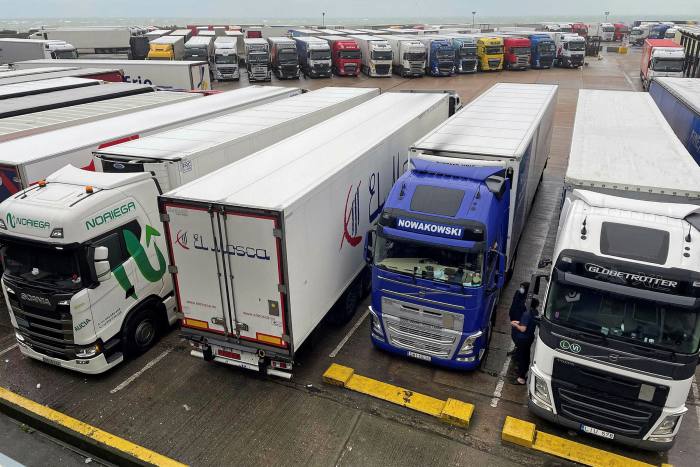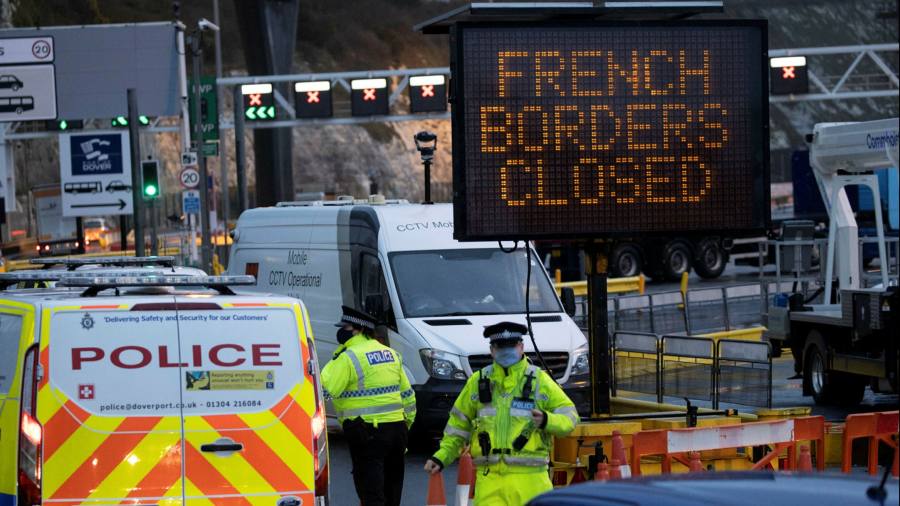British hauliers and exporters were counting their losses on Monday after France closed its borders to drivers from the UK without notice on Sunday night as a precautionary measure against the spread of a new strain of the Covid-19 virus.
Trucks that failed to meet the 11pm deadline on Sunday backed up outside the Channel port of Dover on Monday morning, forcing the government to trigger Operation Stack to hold lorries on the M20 motorway that serves as the UK’s main route to continental Europe.
Dover accounts for 17 per cent of all British goods trade by value and is particularly important for imports and exports of fresh food. In addition to 10,000 trucks on a normal day, the port and nearby Channel Tunnel also handle huge volumes of passenger traffic — which was also barred from entering France.
The Road Haulage Association (RHA) said the queue had reached several miles long by lunchtime and forecast that it was likely to lengthen as drivers in northern Britain tried to return to the continent. Manston Airport, near Ramsgate, would also be available as an emergency truck park capable of storing up to 4,000 vehicles, the Department for Transport said, warning hauliers to brace for “significant disruption” in the coming days.
Traffic on the French side was light, however, after drivers decided to stay away while the two governments negotiated health protocols to enable trucks to flow again from the UK side. “Most French companies have decided not to send their trucks, so there’s less traffic in Calais,” said Sébastien Rivera of the National Road Transport Federation in the Calais region.
France took its drastic action after UK scientists indicated the new Covid-19 variant could be twice as infectious as previous strains. Businesses said the queues also provided a foretaste of logistical issues that the UK is expected to face on January 1 when it enters its new trading relationship with the EU, which is the subject of negotiations in Brussels this week.
Stephen Phipson, chief executive of Make UK, the manufacturers’ group, said his members were already reporting delays to inbound materials and rising freight costs, warning that unless the situation could be swiftly resolved, the industry would face a “perfect storm” of headwinds ahead of the end of the Brexit transition. “This disruption has given us a taste of what a ‘no deal’ Brexit would look like,” he added, urging the government to move rapidly to strike a deal in Brussels.
While the Food and Drink Federation said it did not anticipate that the border closure would cause immediate shortages in the shops if the restrictions were limited to 48 hours, as the French government indicated, for individual operators the delays still caused painful losses.


Ian Baxter, who owns Nottingham-based Baxter Freight, said the delays were costing the industry “many millions of pounds every hour”, with his own trucks ensnared in the border chaos carrying clothes destined for shops in Europe.
Paul Jackson, managing director of Chiltern Distribution in Peterborough, estimated the delay was costing his company more than £5,000 a day. “The French decision just came completely out the blue. We’d committed to six loads that have been cancelled,” Mr Jackson said, adding that with more cancellations already coming in for Tuesday, losses would mount.
The company had explored alternative short crossings to Belgium and the Netherlands to bypass French controls, but discovered these were booked out to January 4.

Other operators such as the fishing and haulage group Peche have found their vehicles were stranded in Europe. The Scottish Seafood Association said it would be seeking compensation from the government for lost profits if goods failed to reach target markets in Europe in time for Christmas. “People’s livelihoods and jobs are at stake here,” said Jimmy Buchan, the group’s chief executive.
Philip Edge, chief executive of UK freight forwarder Edge Worldwide, questioned whether European truckers would risk entering the UK, deepening existing haulage capacity shortfalls. “Do we have the capacity over here, in terms of drivers, to pick stuff up? That’s not the case a lot of the time.”
The RHA said that even if controls were lifted in 48 hours, it expected continued delays as trucks descended on the Channel ports in order to get out in time for Christmas.
In Dover itself, trucks were parked nose-to-tail on some streets near the Western Docks on Monday, with many stranded drivers fretting over whether they would get home for Christmas.
Gregor Dziemidowicz, who was driving a van-load of furniture, said the situation was “catastrophic” from his point of view. He was due to drive home to Gdansk in Poland after three weeks away but had no idea whether he would be home in time to celebrate Christmas with his wife and children. “My family are waiting,” he said, ruefully.
Closer to home was Damien Doherty who was hoping to make it back to Buncrana, County Donegal, in the Irish Republic after sending his trailer-load of fish unaccompanied on the ferry to Boulogne. He was now stuck waiting for its return, hopefully in time to catch a ferry back to Ireland for Christmas.
Non-perishable goods industries were also affected. Peter Shaw, who owns medical equipment supplier C&P Medical, said he had been relying on a shipment of safety needles now caught in Calais to build up essential government-mandated medical stockpiles ahead of next year. “No one is sending trucks to the UK, not knowing whether they are coming back,” he said.
More immediately, pharmaceutical company Pfizer said it was working with the government to ensure that the delays did not affect the delivery of its Covid-19 vaccine, by ship or, if necessary, by air. “As with all our supply chain operations, we keep these routes under close observation to mitigate against delays,” the company said.
Reporting by Peter Foster, Daniel Thomas, George Steer, Sarah Neville, Victor Mallet in Paris and Robert Wright in Dover


